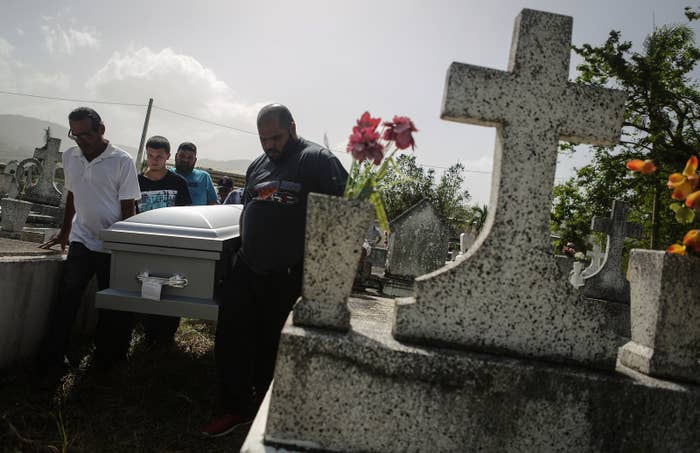
The Puerto Rico Institute of Statistics filed a lawsuit Thursday against the island's health department and demographic registry in order to obtain the government's data on the number of deaths following Hurricane Maria.
The legal action comes days after a study published in the New England Journal of Medicine put the death toll at nearly 6,000. The government's official death count is 64.
In the filing, the Institute of Statistics asks the court for the immediate release of the 2017 mortality data and urges the court to compel "the Secretary of Health and the Director of the Demographic Registry to comply fully ... under penalty of civil contempt."
The institute's executive director, Mario Marazzi-Santiago, told BuzzFeed News that accurate data is desperately needed so that the government can prevent deaths during this hurricane season, which began on Friday.
He said if the data were public, experts from around the world could analyze where people were dying most frequently after a hurricane, and why.
"So that in the aftermath, in the very immediate recovery of a hurricane, in the first two or three months after something like Hurricane Maria, we can save lives — we can prevent deaths that are preventable. That is our main motivation here," Marazzi-Santiago said.
The institute's board approved a resolution on April 25 to establish new procedures and "methodological norms" to measure the death toll from Hurricane Maria and future disasters, given the apparent lack of a clear methodology from the Department of Public Safety and Department of Health. But to get those measures in place, they needed data from the island's Department of Health and Demographic Registry.
Marazzi-Santiago said all requests for the data went unanswered by the health department, the Demographic Registry, and the governor.
"We requested the information formally, and then we subpoenaed the information. All of our requests have gone unanswered, and so we have proceeded to do the next thing that happens in these cases," he said.
After the Harvard study published in the New England Journal of Medicine this week, Gov. Ricardo Rosselló said his administration wants "the real number to come out."
"We had a protocol that really was subpar, and we recognize it. And now really, towards the future, we want to make sure that it is effective."
Marazzi-Santiago said making the mortality data publicly available is a crucial step toward addressing those problems.
On CNN on Thursday night, Rosselló was also questioned about his government's refusal to share the data with the Harvard researchers.
"I signed an executive order whereby this data is being accessible. We’ve opened the books," he said, adding, "I will look into it and if it’s true, there will be hell to pay."
Puerto Rico Gov. Ricardo Rosselló says “there will be hell to pay” if government data on Hurricane Maria is not being made available by officials https://t.co/9ajpeXaXpO https://t.co/Wq0ZSkmdqG
The executive order Rosselló referred to announced that the Puerto Rican government commissioned a study by George Washington University, but did not release any data publicly or to any group other than the GWU researchers.
"I think it’s good news," said Marazzi-Santiago, in response to Rosselló's comments. "Hopefully he’ll come through. We’ll see. I am a little surprised he’s surprised, but it’s possible, I suppose. The governor is a very busy person, but my understanding is that there is already a previous lawsuit and it wasn’t done by me."
"With regards to 'There will be hell to pay,' great — that is exactly the attitude we need, and I hope he applies it to the folks who have this data," he said.
The institute is also under threat from the Rosselló administration's cost-cutting plans, which propose to dismantle the agency and instead establish a statistics program within the Department of Economic Development and Commerce (DEDC). It would also eliminate the agency's independent board of directors.
"We were created not so that we have the data but so that everyone has the data, reporters included," Marazzi-Santiago said. He said the controversy over the death toll reiterates the need for an independent body like the institute, which is funded by the government but is independent in its charter and board of directors.
This is not the first time that the Puerto Rican government has been sued in a bid for transparency about Hurricane Maria's devastation on the island. In February, the Center for Investigative Journalism (CPI) also sued the Puerto Rico Demographic Registry for statistical information on the number of deaths in the months following the storm.
As far back as early October, BuzzFeed News reached out to Puerto Rico's Department of Health, which oversees the Demographic Register, and the governor's office to ask about the apparent discrepancies between the official death toll and what sources on the ground were telling us.
The lawsuit also requests that the government publish monthly mortality totals, which it has not been doing since the hurricane. Marazzi-Santiago said they're not just asking for hurricane-related death data but general data about deaths, which should be public information.
"If all these things were done, we would be in a better position to inform reporters, inform the federal government, inform researchers, to prevent deaths in the aftermath of any future hurricane," Marazzi-Santiago said.
A spokesperson for Puerto Rico's Department of Health and a spokesperson for the governor's office did not immediately return requests for comment.

